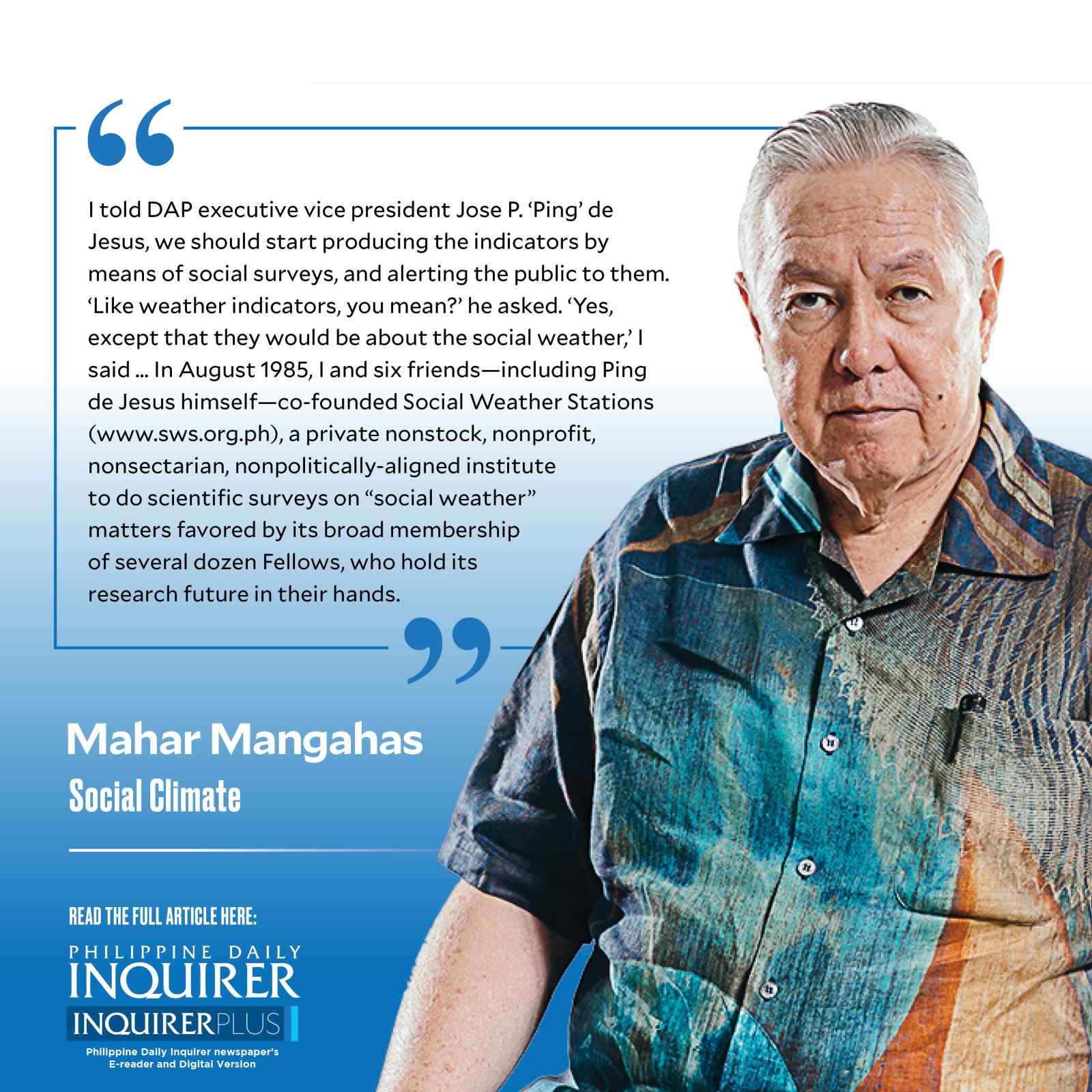‘Social indicators’ started it all (2)

Last week’s piece ran out of space at the point of proposing the next step in social indicators research at the Development Academy of the Philippines (DAP), after the initial work had laid out the principles and viewed the secondary data (“‘Social indicators’ started it all (1),” 6/3/23).
Next, I told DAP executive vice president Jose P. “Ping” de Jesus, we should start producing the indicators by means of social surveys, and alerting the public to them. “Like weather indicators, you mean?” he asked. “Yes, except that they would be about the social weather,” I said.
Ping liked the idea, and I accepted his offer to be full-time head of a new DAP department called Research for Development, initialed RfD.I weighed the consequences carefully. On the minus-side, it meant leaving my economics faculty job at University of the Philippines (UP) Diliman, and missing the new, talented students arriving every year. On the plus-side, it meant being able to gather primary data on topics of my choice. I wrote UP president Edgardo Angara to explain that DAP pulled me in, and UP did not push me away.
SWS started at DAP. I narrated in “The Philippine Social Climate: From the SWS Surveys,” Anvil Publishing, 1994, page ix: “RfD’s first activity, named the Social Weather Stations (SWS) project, aimed to conduct periodic surveys demonstrating the actual generation of new social indicators for the country. With a small force of interviewers, RfD did a series of quality of life surveys, several in Metro Manila in 1981 and 1982, and one in the entire country over March-May 1983. These surveys, funded mainly by the President’s Center for Special Studies (PCSS), are now especially valuable as a source of statistically-representative data on Filipino perceptions of political and economic conditions prior to the assassination of Ninoy Aquino in August 1983.” “Thus RfD provided PCSS, for a short while, with a survey data base capable of informing the President about poverty, about his performance rating, and about many other matters missing from conventional statistical sources. (I don’t know how much of the survey findings were reported upstairs, however, since reporting to Marcos was PCSS’s job. Marcos’s reputation was that he could not swallow statistics unless sugar-coated.)”
“… The DAP was about to publish a book, ‘Measuring the Quality of Life: A 1982 Social Weather Report,’ containing the 1981-82 RfD surveys, but suddenly changed its mind just before printing in early 1983 … We never knew what was objectionable about the book, or who objected to it. Thus our hope, or perhaps our gamble, that the Marcos government could tolerate an open system of social indicators proved fruitless. Soon after I resigned from the DAP in 1984, RfD was disbanded.” (The suppressed RfD book had chapters on: Net Beneficial Product; Income, Poverty, Inequality; Wages and Employment; The Living Environment; Health and Nutrition; Education; Reproducible Capital and Natural Resources; Public Safety and Justice; Political Well-Being; and Towards the Next Social Weather Report. Its page-proofs are deposited at the libraries of DAP, SWS, and the UP School of Economics.)
The 1984-1985 BBC surveys included social indicators. In 1984 and 1985, the Bishops-Businessmen’s Conference for Human Development (BBC) (a civic organization of Catholic bishops and businessmen, but also having some labor leaders and academics like myself) conducted two nationwide sociopolitical surveys, with funding from private businessmen and the Asia Foundation.
The surveys were a project of the BBC research committee, co-chaired by Fr. Joaquin Bernas, SJ and banker Victor Barrios. I agreed to their request to be technical director; the surveys were done privately without DAP involvement. Their critical findings were that 60 percent of Filipinos were opposed to the presidential powers of (a) legislation by decree, and likewise (b) detention by fiat. The media reports of the 1984 BBC survey identified me not just as a BBC member, but also as a DAP vice president, causing it some embarrassment. When Ping de Jesus asked me why I didn’t warn him beforehand, I said that if I did, he might have felt obliged to give me some advice about doing it. Being unaware of the BBC survey absolved him of any responsibility. Bear in mind that DAP had been closely watched by the Marcos administration ever since December 1977, when Horacio “Boy” Morales, Ping’s predecessor, suddenly went underground to join the National Democratic Front. Ping pointed out that my DAP rank was too high for it to ignore my role in the BBC survey. I gave him my resignation, effective after a previously scheduled training program on social indicators for international participants at the DAP Tagaytay center.
Social indicators research is not a one-person job. Thanks to the Almighty, the research continues. In August 1985, I and six friends—including Ping de Jesus himself—co-founded Social Weather Stations (www.sws.org.ph), a private nonstock, nonprofit, nonsectarian, nonpolitically-aligned institute to do scientific surveys on “social weather” matters favored by its broad membership of several dozen Fellows, who hold its research future in their hands.
—————-
Contact: mahar.mangahas@sws.org.ph.




















